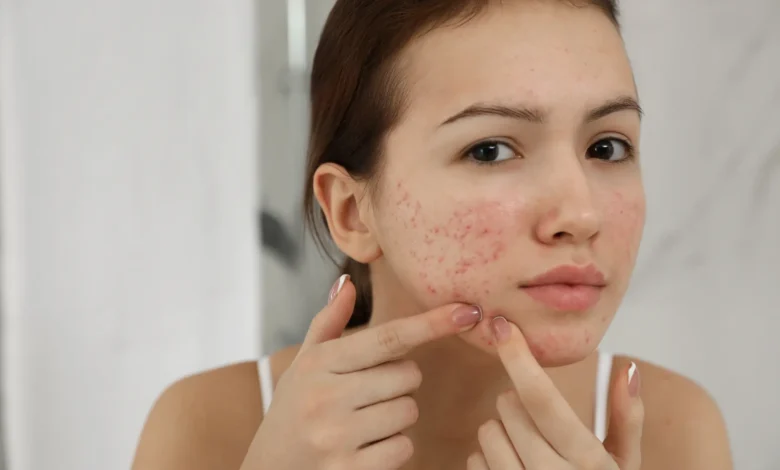The Ultimate Guide to Natural Acne Treatments for Clear, Glowing Skin

Are you dreaming of clear, glowing skin without relying on harsh chemicals? You’re not alone. Acne is a common struggle, and embracing natural treatments can be transformative. This comprehensive guide will explore natural remedies and lifestyle changes to help you achieve the radiant skin you’ve always desired.
Understanding Acne
What Causes Acne?
Acne is a widespread skin condition affecting millions globally. It occurs when hair follicles become clogged with oil and dead skin cells. Factors such as hormonal changes, diet, stress, and genetics significantly contribute to its development.
Types of Acne
Knowing the types of acne can help you select the right treatment. The most common types include:
- Blackheads: Small, dark lesions that are open at the surface.
- Whiteheads: Closed, small white bumps under the skin.
- Papules: Small, red, raised bumps.
- Pustules: Red, inflamed lesions with white or yellow pus at the center.
- Nodules: Large, painful lumps beneath the skin.
- Cysts: Deep, painful, pus-filled lesions.
Each type varies in severity and requires specific care.
Why Choose Natural Treatments?
Natural treatments offer several benefits over conventional options:
- Gentle on the Skin: They are typically less harsh and reduce the risk of side effects.
- Holistic Approach: They address not just symptoms but also underlying causes.
- Eco-Friendly: They tend to have a lower environmental impact compared to chemical-based products.
Top Natural Ingredients for Acne Treatment
Tea Tree Oil
Tea tree oil is celebrated for its antibacterial and anti-inflammatory properties. It can reduce redness and swelling when applied in a diluted form. Its historical use underscores its effectiveness as a natural remedy.
Aloe Vera
Aloe vera is renowned for its soothing effects. With anti-inflammatory and antibacterial properties, it helps heal existing acne and prevent future breakouts. Fresh aloe vera gel is ideal for the best results.
Honey
Raw honey boasts powerful antibacterial properties, making it an excellent natural acne treatment. Its soothing nature helps reduce inflammation and redness. Regular application of a honey mask can significantly benefit your skin.
Lifestyle Changes for Acne-Free Skin
Healthy Diet
Your diet plays a crucial role in skin health. Incorporate foods rich in antioxidants, vitamins, and minerals, such as fruits, vegetables, nuts, and seeds, to nourish your skin from within.
Hydration
Staying hydrated helps flush out toxins and maintains skin health. Aim for at least eight glasses of water daily to keep your skin clear and radiant.
Stress Management
Stress can exacerbate acne by increasing hormone production. Engage in stress-reducing activities like yoga, meditation, and regular exercise to help keep your skin clear.
Home Remedies You Can Try Today
Apple Cider Vinegar
Apple cider vinegar helps balance pH levels and eliminate acne-causing bacteria. Dilute it with water and use it as a toner. Always patch test to avoid irritation.
Green Tea
Rich in antioxidants, green tea reduces inflammation and fights bacteria. Drink it or apply cooled tea bags to your skin for a soothing effect.
Oatmeal Masks
Oatmeal’s anti-inflammatory properties soothe irritated skin. Create a mask by mixing it with honey or yogurt for added benefits.
Essential Oils for Acne-Prone Skin
Lavender Oil
Lavender oil is known for its calming and healing properties. It helps reduce inflammation and promote healing of acne scars. Use it diluted to prevent irritation.
Peppermint Oil
Peppermint oil has a cooling effect that reduces swelling and redness. Its antibacterial properties make it effective for acne. Always dilute it before use.
Rosehip Oil
Rich in essential fatty acids and antioxidants, rosehip oil helps repair and regenerate skin tissue. It’s particularly useful for treating acne scars and improving skin texture.
Natural Supplements for Skin Health
Zinc
Zinc is crucial for skin health, reducing inflammation and regulating oil production. A zinc supplement can help manage acne breakouts.
Omega-3 Fatty Acids
Found in fish oil and flaxseed oil, omega-3 fatty acids have anti-inflammatory properties that benefit acne-prone skin and overall skin health.
Probiotics
Probiotics promote a healthy gut, which in turn can enhance skin health. They help balance the microbiome and reduce inflammation. Include probiotic-rich foods like yogurt and kefir in your diet for added benefits.
Skincare Routine Tips
Gentle Cleansing
Use a mild, natural cleanser to avoid stripping your skin of essential oils. Harsh cleansers can increase oil production and worsen breakouts.
Exfoliation
Exfoliate once or twice a week to remove dead skin cells and prevent clogged pores. Avoid over-exfoliating, which can irritate and worsen acne.
Moisturizing
Even oily skin needs moisturizing. Natural moisturizers like jojoba oil or aloe vera gel hydrate without clogging pores. Choose non-comedogenic products to avoid breakouts.
Avoiding Common Acne Triggers
Dirty Pillowcases
Pillowcases can trap bacteria and oil. Wash them regularly and use a fresh one every few days to prevent transferring these impurities to your skin.
Touching Your Face
Touching your face transfers bacteria and oils from your hands, leading to acne. Keep your hands away from your face to minimize this risk.
Makeup
Opt for non-comedogenic, natural makeup products to avoid clogged pores and breakouts. Always remove makeup thoroughly before bed.
Benefits of Natural Acne Treatments
Fewer Side Effects
Natural treatments are generally milder on the skin, reducing the risk of irritation and dryness compared to chemical-based products.
Holistic Approach
Natural remedies often address the root causes of acne, leading to more sustainable and long-term improvements in skin health.
Environmental Impact
Natural ingredients are typically biodegradable and have a lower environmental impact than many conventional acne treatments, which can pollute waterways and harm wildlife.
When to See a Dermatologist
Severe Acne
If natural treatments don’t help with severe acne, seek professional advice. Dermatologists can offer advanced treatments and management strategies.
Persistent Acne
Consult a dermatologist if your acne persists despite various remedies. They can identify underlying issues and recommend appropriate treatments.
Scarring
For concerns about acne scars, a dermatologist can provide treatments to reduce their appearance and prevent them from becoming more prominent.
Conclusion
Natural acne treatments offer a gentle, holistic path to clear, glowing skin. By incorporating these remedies and lifestyle changes, you can effectively manage acne and enhance overall skin health. Remember, consistency is key, and results may take time.
Ready to embrace natural acne treatments? Start implementing these tips today and consider consulting a skincare professional specializing in natural remedies for personalized advice and support. Clear, glowing skin is within your reach!


